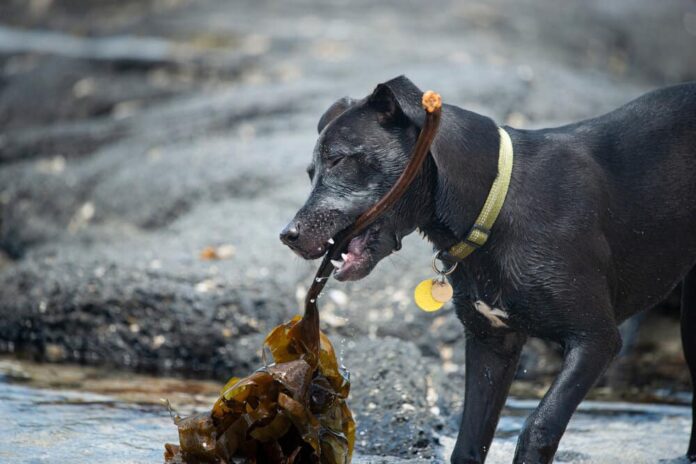Hey there, fellow pet parents! Ever caught your pup giving you those puppy eyes while you’re munching on some crispy seaweed snacks? Well, I’ve got some good news for ya – dogs can actually eat dry seaweed, but there’s a bunch of important stuff you need to know first!
The Quick Answer (For Those in a Hurry!)
Yes, dogs can eat dry seaweed in moderation, but it MUST be the commercially prepared kind meant for human consumption. Never let your doggo eat wild seaweed from beaches – that’s a big no-no!
Why Dry Seaweed Can Be Amazing for Your Dog
Listen up because dry seaweed is literally packed with awesome nutrients that could benefit your four-legged bestie
- Omega-3 fatty acids – great for that shiny coat and healthy skin
- Iodine – helps keep their thyroid happy
- Iron – perfect for energy levels
- Protein – muscle maintenance, anyone?
- Vitamins B12 & A – boost immune system
- Fiber – helps with digestion
The Right Way to Feed Dry Seaweed to Your Dog
Here’s how to do it safely:
- Start Small: Like, really small! Just a tiny piece to see how they react
-
Choose Wisely Only go for
- Plain, unseasoned nori sheets
- Commercial seaweed snacks without additives
- Seaweed supplements made specifically for dogs
-
Avoid These Types:
- Seasoned seaweed (especially with garlic or onion)
- Wild seaweed from beaches
- Seaweed with added salt or preservatives
Warning Signs to Watch Out For ⚠️
Even tho seaweed is generally safe, keep an eye out for these symptoms:
- Tummy troubles
- Excessive thirst
- Diarrhea
- Vomiting
- Unusual behavior
If you notice any of these, maybe your pup’s just not vibing with seaweed – and that’s totally okay!
The Big NO-NOs of Seaweed and Dogs
1. Beach Seaweed
OMG, this is super important! Never ever let your dog eat seaweed from the beach because:- It might be contaminated with pollutants- Could contain dangerous microorganisms- Might expand in their tummy and cause blockages- Could be mixed with harmful algae
2. Seasoned Seaweed Products
Watch out for – Added salt (too much sodium is bad!)- Artificial flavors- Seasonings like garlic or onion (toxic for dogs!)- Preservatives
How Much is Too Much?
Here’s a rough guide for feeding dry seaweed:
- Small dogs: max 1/4 sheet of nori per week
- Medium dogs: max 1/2 sheet per week
- Large dogs: max 1 full sheet per week
Remember, these are just guidelines – every dog is different!
Creative Ways to Serve Seaweed to Your Dog
Want to make it fun? Try these:1. Crumble plain nori over their regular food2. Use small pieces as training treats3. Mix with wet food for added texture4. Create little seaweed rolls with their favorite foods
The Bottom Line: Should You Feed Your Dog Dry Seaweed?
If you’re doing it right, dry seaweed can be a healthy addition to your dog’s diet. Just remember these key points:
✅ Always use commercial, human-grade seaweed✅ Start with tiny amounts✅ Watch for any adverse reactions✅ Keep it as an occasional treat❌ Never feed beach seaweed❌ Avoid seasoned varieties
FAQ About Dogs and Dry Seaweed
Q: Can puppies eat dry seaweed?A: Better wait until they’re at least 1 year old, their tummies are sensitive!
Q: What if my dog ate seaweed from the beach?A: Contact your vet ASAP – this could be dangerous!
Q: Can dry seaweed help with my dog’s allergies?A: Some pet parents report improvements, but always check with your vet first.
Final Thoughts
Dry seaweed can be a super healthy treat for your furry friend when given properly. Just remember to be careful with portions and always choose the right type. And hey, if your dog doesn’t like it? No biggie – there are plenty of other healthy treats out there!
Remember to always trust your instincts as a pet parent and when in doubt, give your vet a shout! They know best when it comes to your specific pup’s needs.
Have you tried giving your dog dry seaweed? How did they like it? Drop a comment below – I’d love to hear your experience!
Disclaimer: Every dog is different, so what works for one might not work for another. Always consult with your veterinarian before making significant changes to your dog’s diet.












